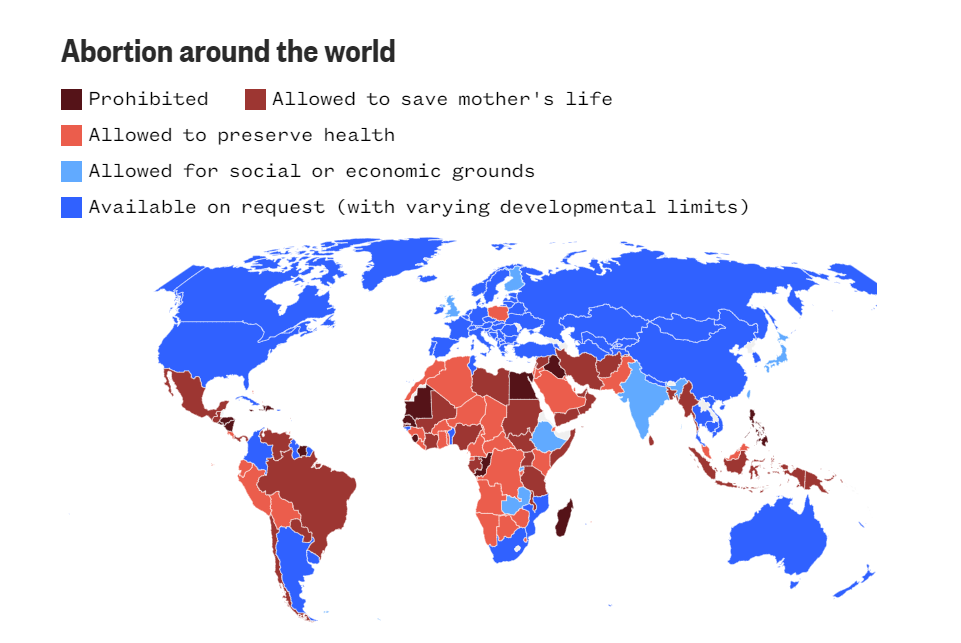Abortion: Murder or Bodily Autonomy?
The second wave of feminism was an intersectional movement, that gained traction in the late 1960’s as a response to the contemporary issues of the time focusing primarily on rape culture, equality in the workplace and reproductive rights. In 1971, in an act of civil disobedience, the French writer Simon de Beauvoir, along with 343 other women penned “Manifesto of the 343” — a petition declaring they have had illegal abortion. At the time, abortion was illegal in France — a crime against the state, punishable by death penalty — thus admitting to it, they exposed themselves to criminal prosecution. Two years after the Manifesto was published, in 1973 American women were guaranteed the right to abortion, as per Supreme Court’s interpretation of the Fourteenth Amendment. Consequently, the court found Texas laws criminalizing abortions as violative of women’s constitutional rights, the case that came to be known as Roe vs Wade.
“One million women in France have abortions every year. Condemned to secrecy they do so in dangerous conditions, while under medical supervision this is one of the simplest procedures. We are silencing these millions of women. I declare that I am one of them. I declare that I have had an abortion. Just as we demand free access to contraception, we demand the freedom to have an abortion.” Excerpt from Manifesto of the 343
The women of the 21st century continue to be victimized by patriarchal ideals, just as the women in the 20th century were and women before that. An uncommon factor among the different waves of feminism is the emergence of internet as a rallying point for people across the world. Despite being in the age of constant connectivity, and the resultant creation of a feedback loop where people can express their grievances in real-time on public platforms, making it accessible for our government representatives to know our needs, and address them accordingly — we are at crossroads when women’s rights are involved.
Around the same time when France took a historic and revolutionary step making abortion a constitutional right, Roe vs Wade was overturned, and Alabama’s Supreme Court ruled frozen embryos are children — leading to uncertainty regarding the future of IVF. While the world is increasingly moving towards anti-abortion path, there is an emergence of a contradictory situation where more women are getting abortion, there is a 10% increase in the instances of abortion as compared to the preceding years. Pregnant women living in anti-abortion states in America, seeking to terminate their pregnancy are forced to travel to states that offer legal abortions, at significant financial and logistical cost.
Reproductive rights are part of the spectrum of women’s rights, and by virtue —human rights. Banning abortion services does not eliminate the need for abortion, but by restricting access to safe abortion, women are forced to resort to unsafe methods. Pregnancies in the event of rape or birth defects shouldn’t be the only times women should have legal access to abortion, women should be allowed to get abortion under any and all circumstances (if they want to) due to the mere fact that it’s her body, thus her choice. Bodily autonomy is generally respected across various scenarios, except when it pertains to a woman's attire choices and pregnancy.
Abortion is prohibited altogether in 24 countries. At the core of the issue with abortion is the narrative that it is a criminal act involving murder, murder of a fetus. The argument about murder stems from the ambiguity in the interpretation of “right to life for all human beings”, but at what point does that right becomes applicable? Does life begin at conception, fertilization or at birth? If the right begins at conception, then should the fetus's rights take precedence over those of the mother, compelling her to prioritize her child's “right to life” at the expense of her own “freedom of opinion and expression”? Is the life and freedom of the mother not as important as the unborn child’s?
Then there is also the religious and ethical argument regarding abortion, while in Christianity and Judaism abortions are allowed in certain circumstances, overall, they are anti-abortionists. Conservatives argue that abortion infringes upon their right to “exercise their religious freedom”, voicing their support for making abortions illegal. Religious leaders are pivotal in influencing the mindset of their subjects, historically, the Catholic Pope’s have sided with the pro-lifers, calling abortion as “murder” — believing life starts at conception. Religion plays a significant role in spreading anti-abortion sentiments, many perverse and archaic thoughts are shielded and swept under the rug of religion.
The discourse about abortion should also not be restricted to the paradigm of “my body, my choice”, but must be examined from the broader perspective of women’s access to healthcare. The trend of gradual erosion of women's rights in recent times, in an attempt to align with patriarchal ideologies, is alarming. Every woman must have the freedom of choice to follow her personal (and religious) convictions concerning the completion or termination of a pregnancy — without anyone interfering with her decision. To quote Rachel from Friends, “No Uterus, No Opinion.”
I, for one, am personally grateful to be living in a country that allows safe abortion.
Edit: After the article was published, Arizona banned abortion. Until now, abortion has been legal in Arizona through 15 weeks of pregnancy. But the 1864 law, which was enacted many decades before Arizona became a state, outlaws’ abortion from the moment of conception, except when the procedure is necessary to save the life of the mother. It makes no exceptions for rape or incest, and doctors prosecuted under the law could face two to five years in prison.




